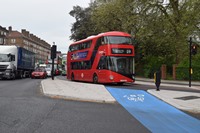
Written submissions requested to identify cost-effective strategies to make better use of limited road space, with the deadline of December 9
The Transport Select Committee has launched a new inquiry looking at how to tackle urban traffic congestion.
The inquiry into Urban congestion aims to identify cost-effective and safe strategies for managing limited road space in towns and cities, while minimising disruption to local communities and businesses.
The Committee said it intends to examine appropriate combinations of measures that can come together to form integrated urban traffic management strategies, including bus priority measures; road-pricing; street-running trams; parking schemes; cycling and walking infrastructure; and use of innovative traffic management technologies. The Committee will seek to identify balanced approaches that can be adapted to local circumstances, and are fair towards all types of road user.
The Committee is particularly interested in two key areas.
The first of these is integrated strategies for managing competing demands for urban road space; shifting people from private vehicles to public and active transport modes in urban areas; and reducing urban road traffic congestion. This includes consideration of:
- Bus priority measures (including bus lanes);
- Local road pricing, including lessons from the London congestion charge and low emissions zones;
- Parking schemes, including workplace parking levies;
- Cycling and walking infrastructure;
- Street-running tram and trolley-bus systems; and
- Technological innovations such as intelligent transport systems and telematics.
The second area is wider considerations. This includes:
- Managing disruption to local communities and businesses during construction and operation;
- Construction and operating costs;
- Approaches to cost-benefit calculations;
- Implications for the sustainability of the market for provision of bus services; and
- The safety of road users, particularly cyclists and pedestrians.
The Committee has asked for written submissions to be submitted by Friday, December 9. Evidence submitted after this date will still be accepted, but may not inform the oral evidence sessions.
Written submissions should be as short as is consistent with conveying the relevant information – ideally six pages or less. Paragraphs should be numbered for ease of reference.
Evidence should be submitted via the appropriate inquiry page on the Transport Committee website in Word or Rich Text format, with as little use of colour and images as possible.
Once accepted by the Committee, written evidence becomes the Committee’s property and it may decide to publish it or make other public use of it.
INFO
Written submissions can be made at https://www.parliament.uk/business/committees/committees-a-z/commons-select/transport-committee/

